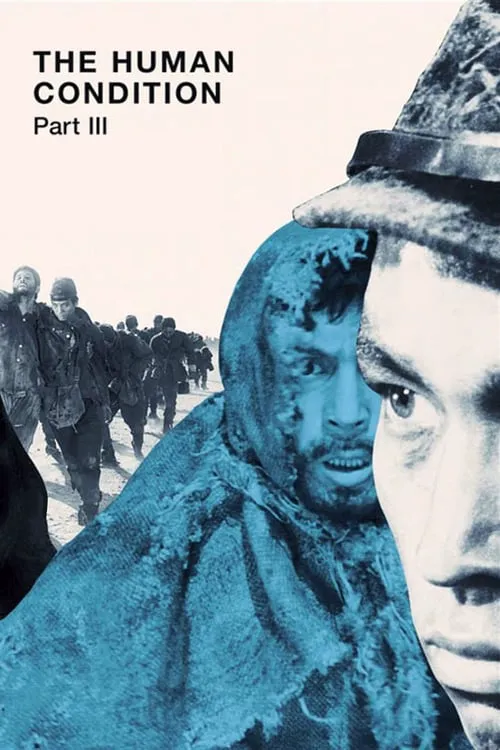The Human Condition III: A Soldier's Prayer

Plot
The Human Condition III: A Soldier's Prayer marks the final installment of Masaki Kobayashi's epic trilogy, which delves into the complexities of the human experience during wartime. Set against the backdrop of a defeated Japan on the verge of withdrawal from Manchuria, the film follows Kaji, a character from the previous two installments, as he navigates a treacherous landscape in a desperate bid to reunite with his loved ones. As the story begins, Kaji and the last remnants of their battered battalion are pushed to the brink of collapse. The once-mighty Japanese army now limps along, struggling to hold onto its dwindling territory in the face of the relentless Soviet onslaught. With their backs against the wall, the soldiers are forced to resort to guerrilla tactics, operating in the shadows and conducting a series of hit-and-run operations against their more powerful enemy. Kaji, a man haunted by the memories of his past and still grappling with the moral implications of his experiences during the war, finds himself drawn to a small group of fellow soldiers who share his determination to escape the carnage and return to a life of peace and normalcy. Among these individuals is a young recruit, a boy barely out of his teenage years, who bears a striking resemblance to Kaji's own son, Shoji. As Kaji and his companions embark on their perilous journey across Manchuria, they are forced to confront the harsh realities of a world torn apart by conflict. The once-fertile landscape has been scarred by the ravages of war, with destroyed cities, burned-out villages, and ravaged countryside stretching as far as the eye can see. Amidst this desolation, however, lie pockets of humanity, people struggling to survive in a world that seems determined to snuff out the flame of existence. Kaji's relationship with his young companion serves as a poignant reminder of the devastating impact of war on the lives of ordinary people. As the two men form a bond, sharing moments of tenderness and laughter amidst the chaos, the audience is reminded that, amidst the violence and destruction, there remain moments of beauty and humanity that refuse to be extinguished. Throughout the film, Kobayashi's masterful direction masterfully interweaves themes of redemption, sacrifice, and the enduring power of human spirit. Kaji's character, in particular, is subjected to a grueling examination, as he grapples with the moral implications of his actions during the war. His struggles to atone for past mistakes, to find forgiveness, and to rediscover a sense of purpose serve as a powerful testament to the human capacity for growth and transformation. As the story unfolds, Kaji and his companions find themselves increasingly embroiled in a series of hair-raising escapades, dodging enemy patrols, navigating treacherous terrain, and evading death by the narrowest of margins. Amidst the intensity of these sequences, the filmmakers take care to inject moments of quiet introspection, as the characters pause to reflect on the cost of war and the value of human life. Ultimately, The Human Condition III: A Soldier's Prayer presents a searing commentary on the devastating consequences of conflict and the enduring power of the human spirit. In this, the final installment of Kobayashi's epic trilogy, the director delivers a work of profound emotional depth, a cinematic testament to the indomitable will to survive and the enduring capacity of human beings to find hope and redemption in the darkest of times. As the film hurtles toward its conclusion, Kaji and his companions finally achieve their goal of escaping the battle-scarred landscape of Manchuria. Yet, the true victory lies not in their physical escape, but in the emotional release that comes with leaving behind the trauma of war and rediscovering a sense of purpose, of belonging, and of human connection. In this hauntingly beautiful conclusion to the Human Condition trilogy, the filmmakers remind us that even in the darkest of times, there remain moments of hope, and that the human spirit, though battered and bruised, remains forever resilient.
Reviews
Recommendations




